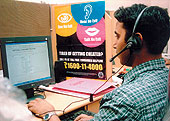 |
| TROUBLESHOOTERS: A team of 10 professionals are working for the new helpline. Photo: Prem Singh |
The call came over a week ago from a small town in Tripura. And Chetanya Kumar Bachchas remembers it well. The caller had a simple query for the counsellor working at the National Consumer Helpline (NCH): What?s the difference between a guarantee and a warranty?
Thankfully, Bachchas knew the difference. A guarantee is a categorical assurance for repairs, and if need be, replacement; a warranty is confined to what the fine print says. Says the counsellor, ?People keep coming up with interesting questions. But one thing is clear: most consumers don?t know where to go and whom to approach with their problems.?
Bachchas has been trying to help them out for the past three weeks. He is part of the 10-member professional team working for the NCH (the toll free number being 1600-11-4000). Launched on March 15 in Delhi, the helpline provides assistance to anybody seeking information, advice or guidance to deal with regular consumer problems.
Be it a defective product, shabby after-sales service or, any other unfair trade practice ? one can seek help from the NCH anytime between 9.30 am to 5.30 pm on all working days from a landline anywhere in India. The NCH catchline goes, ?420 pe bhaari 4000? (4000 is stronger than 420). The Indian Penal Code number for fraud is 420.
Part of the Union government?s department of consumer affairs initiative, the helpline initially intends to assist consumers in matters relating to telecommunication, courier, banking, insurance and financial service. The NCH has a three-tiered plan. First, the caller is briefed about his/her rights and directed to the right person to sort out his grievance. If that doesn?t work, he is guided to the right industry-level body or industry regulator in sectors such as banking and insurance.
If the problem is not sorted out at this level, says Ram Khanna, the project coordinator, the complainant is advised to take the case to the consumer court. ?It is not something we encourage. Because consumer courts are already congested. We want these problems to be sorted out on a bilateral basis,? says Khanna, who also heads the department of commerce in the Delhi School of Economics (DSE).
Those working as professional counsellors ? full-timers selected after a gruelling interview and trained intensively for six weeks ? recount interesting anecdotes of such problem solving. There was this harried Delhi customer, recalls Bachchas, who had bought a new refrigerator with scratches on the door. He wanted a replacement but the dealer only offered to get it painted. Says Bachchas, ?I advised him to write a letter of complaint that ended with the line, ?Please treat this as a legal notice?. The fridge was replaced. In fact, he called back to thank us.?
On an average, the NCH receives about 100 calls a day. Khanna believes that with proper publicity the figure will shoot up much higher. About 60 per cent of the grant has been slotted for publicity. Radio programmes on All India Radio?s FM channels, direct mailers, posters and newspaper ads are the medium. The overall project is worth Rs 3.12 crore, provided by department of consumer welfare fund and made available to Delhi University (DU) over a period of three years.
The idea to set up a national helpline was floated after officials attending a Consumer International Meet in Lisbon in October, 2003, learnt that most developed countries have a national helpline. ?We wanted to do something on similar lines,? says Jayashree Gupta, joint secretary, department of consumer affairs. Several universities were asked to submit a project report; DU was finally selected.
Now with the NCH in operation, Khanna is keen to take the redressal platform to a higher level. He wants to prepare a comprehensive computer knowledge database to identify specific problems that products from a particular company might have. He then plans to take them to the respective companies for redressal. ?At present, companies don?t even have adequate management deployment to deal with consumer problems,? he says.
Currently, located on the ground floor of DSE?s commerce block and to be shifted to a larger hall under construction nearby, the NCH hopes to play a significant role in building consumer awareness. The room, where young boys and girls sit before computer screens taking phone calls from consumers from all over India, looks like a deglamourised version of a call centre. But Khanna has no objection to the reference. ?It is indeed a call centre. But with a difference,? he says, ?It is there to help the man on the street.?
from the record book
Listen up: Telecommunication is one of India’s fastest growing sectors. But according to a compilation of calls received from harried consumers by the NCH in its first week, it is also one of the most troublesome. About 30 per cent of the callers had a litany of complaints in a variety of areas ranging from overcharging to shoddy service.
More to follow: There are bigger culprits though. Home appliances corners the top slot with 35 per cent. “Such findings only reaffirm the need for a strong consumer movement,” says Ram Khanna, coordinator, NCH. Interestingly, there were also complaints on adulteration (5 per cent), credit cards (2 per cent) as well as inquiries about consumer courts (5 per cent).
Near and far: About 52 per cent of the calls came from Delhi. But people also phoned up from as far as Maharashtra (15 per cent), Chhatisgarh (2 per cent) and West Bengal (2 per cent).











